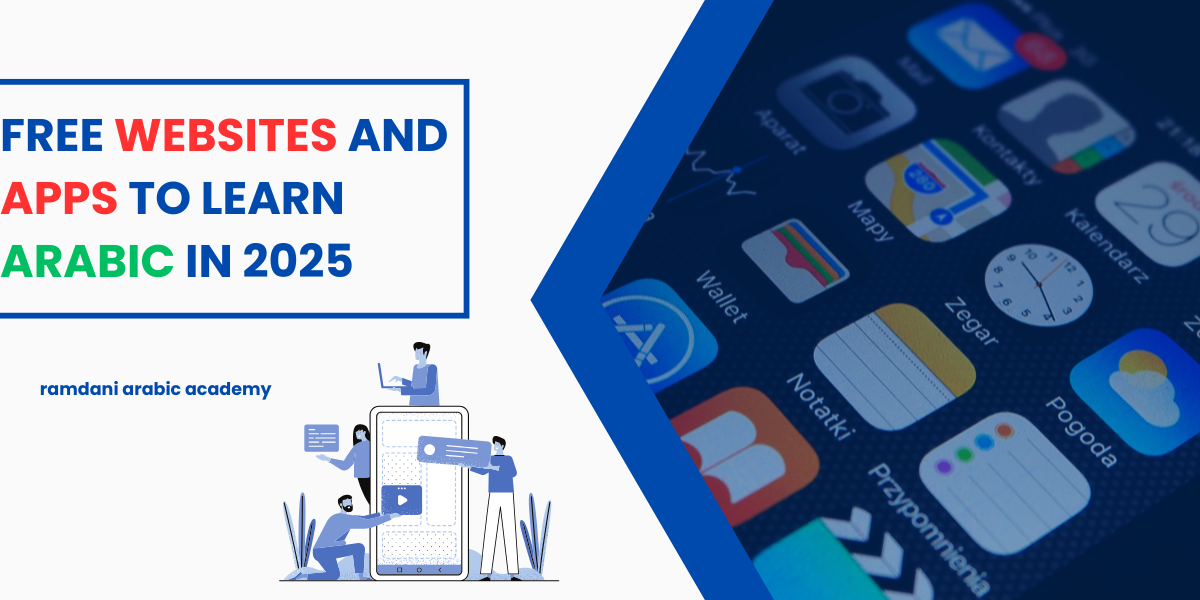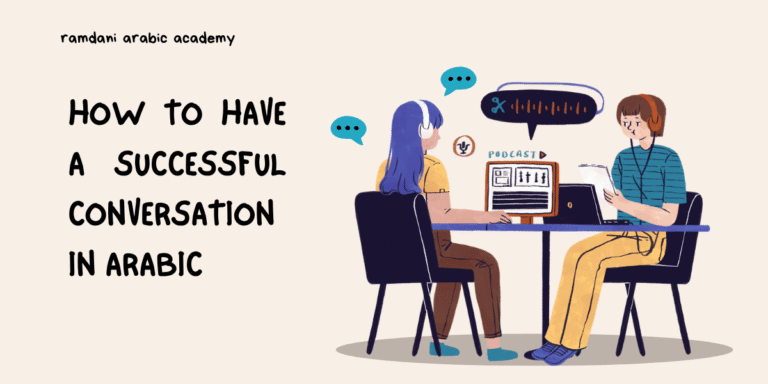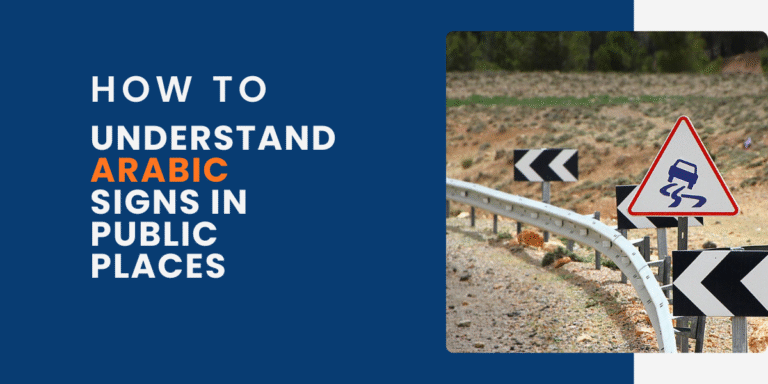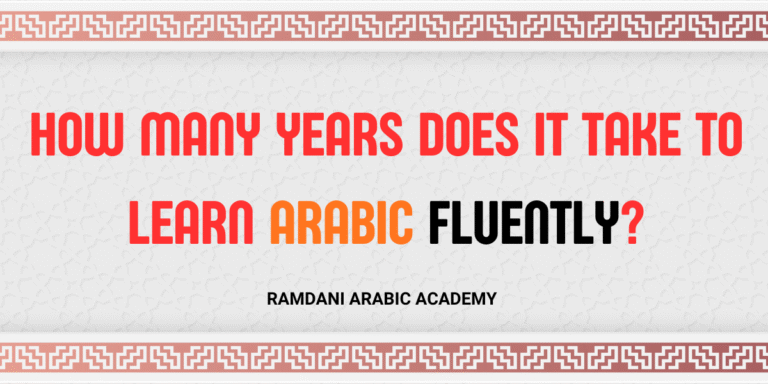Free Websites and Apps to Learn Arabic in 2025
Arabic is one of the most spoken languages in the world, with more than 400 million speakers across over 20 countries. It is the language of a rich culture, history, and literature that has influenced science, philosophy, and religion for centuries. In today’s globalized world, more people than ever are interested in learning Arabic. Some want to communicate with Arabic-speaking communities. Others need it for travel, work, or business. Many are motivated by religion, especially those who want to read and understand the Quran in its original language.
For many learners, the biggest challenge is not motivation but access. Traditional classes can be expensive, hard to find, or too rigid in schedule. In 2025, online education has become the main solution for language learning. Free websites and apps now make it possible for anyone with an internet connection to start learning Arabic from home. These tools are not only cost-free but also flexible. You can practice vocabulary, grammar, and listening skills at your own pace, whether you are a beginner or an advanced learner.
Technology has changed how we study languages. Ten years ago, free resources were limited to basic vocabulary lists and a few YouTube channels. Today, you can find full interactive courses, live tutors, mobile apps with AI chatbots, and platforms that allow you to speak with native Arabic speakers around the world. Some apps use spaced repetition to help you remember new words. Others focus on conversation skills, letting you practice real-life dialogues. There are even tools that correct your pronunciation using speech recognition technology.
The variety of resources available in 2025 is a huge advantage, but it can also feel overwhelming. If you search “learn Arabic free” on Google, you will see hundreds of results. Not all of them are useful, and some are low quality. This is why it is important to know which websites and apps are worth your time. The right platform can keep you motivated, save you hours of frustration, and help you reach your goals faster.
This article is a guide for Arabic learners who want to use free resources effectively. It will introduce you to some of the best websites and apps available in 2025, explain what each one offers, and suggest how to use them as part of your study routine. Whether you are learning Modern Standard Arabic, a dialect like Egyptian or Levantine, or focusing on Quranic Arabic, you will find tools here that match your needs.
Learning Arabic is a journey that requires patience and consistency, but it does not have to be expensive. With the right free resources, you can build a strong foundation in the language, practice every day, and progress step by step toward fluency.

Part 1 – Best Free Websites for Learning Arabic in 2025
The internet is full of websites that promise to teach you Arabic, but only a few stand out as truly useful for serious learners. The key is to choose websites that are well-organized, reliable, and cover more than just the alphabet. You want a resource that helps you build vocabulary, grammar, listening, and reading skills step by step.
Here are some of the best free websites for learning Arabic in 2025.
1. Madinah Arabic
Madinah Arabic has been one of the most popular websites for years. It is designed for beginners and focuses on Modern Standard Arabic, which is the formal version of Arabic used in books, news, and education. The website offers a full course divided into lessons that cover the alphabet, basic grammar, and sentence structure.
Each lesson is short and clear, with examples in Arabic and English. The site also includes quizzes and exercises, so you can test yourself as you go. Madinah Arabic is especially good for people who want a structured, step-by-step approach rather than random vocabulary lists.
2. ArabicPod101
ArabicPod101 offers free audio and video lessons for learners at every level. You can listen to dialogues, follow transcripts, and study vocabulary and grammar explained by teachers. The lessons are short, usually around 10 minutes, so you can fit them into your day.
The free plan includes a lot of material, though you can upgrade to a paid plan for more features. The site covers both Modern Standard Arabic and several dialects, such as Egyptian and Levantine. This makes it useful if you want to speak with native speakers in real life.
3. Quranic
If your main goal is to understand the Quran, Quranic is one of the best websites available. It focuses on teaching Arabic through Quranic vocabulary and grammar. Lessons are interactive and visual, making it easier to remember new words.
You can learn root words, see where they appear in the Quran, and practice through quizzes. The site is free to use, though there is also a mobile app for those who prefer to study on the go.
4. Al Jazeera Learning Arabic
Al Jazeera has a section of its website dedicated to teaching Arabic. It is designed for learners who want to improve their reading and listening skills. The site provides news articles, videos, and interactive exercises.
You can choose your level (beginner, intermediate, or advanced) and follow lessons that teach vocabulary and grammar in the context of real news stories. This is a good choice if you want to practice Modern Standard Arabic as it is used by journalists and media professionals.
5. BBC Languages – Arabic Archive
Even though the BBC stopped adding new material to its language section years ago, the Arabic archive is still online and free. It has audio, video, and text lessons for beginners. The site teaches basic phrases, numbers, and greetings.
It is not as comprehensive as other websites, but it is a good starting point if you just want to get a feel for the language before committing to a full course.
6. Learn Arabic Online
Learn Arabic Online is a website that offers a complete grammar guide, vocabulary lists, and exercises. The design is simple, but the content is detailed and helpful. You can study topics like verb forms, cases, and sentence structure with clear explanations.
This site is good for learners who want to go deeper into Arabic grammar, especially if they already know the alphabet and some basic vocabulary.
7. Internet Polyglot
Internet Polyglot is a vocabulary-building website that supports many languages, including Arabic. You can choose from pre-made word lists, play games, and take quizzes.
It is not a full course, but it is a fun way to review and memorize words. You can also create your own vocabulary lists, which is useful if you want to focus on a specific topic like travel, business, or religion.
8. Busuu (Free Version)
Busuu is known as an app, but it also has a website where you can learn Arabic for free. The free version includes vocabulary lessons, grammar practice, and short dialogues.
The best part of Busuu is the community feature, which allows you to submit writing exercises and get corrections from native speakers. This gives you real feedback, which is something many free websites do not offer.
9. Open Culture
Open Culture is not a dedicated Arabic site, but it collects free language learning resources from around the web. You can find links to free Arabic audio courses, textbooks, and YouTube playlists.
This is a good place to start if you want to explore multiple resources before deciding which ones work best for you.
10. Lexilogos
Lexilogos is a massive collection of Arabic dictionaries, grammar guides, and language tools. You can type Arabic text, look up words, and study root patterns.
It is more of a reference site than a step-by-step course, but it is very useful once you start reading Arabic texts and need to check vocabulary or grammar quickly.
How to Use These Websites Effectively
Simply visiting these websites is not enough. You need a clear plan to get the most out of them.
- Pick one or two main websites to follow daily
- Combine them with vocabulary or grammar exercises from another site
- Spend at least 15–30 minutes a day studying
- Keep a notebook or digital document where you write new words and example sentences
- Review regularly so you do not forget what you learned
Consistency is more important than speed. Ten minutes a day for six months will give you better results than two hours once a week.
These websites give you a free path to start your Arabic learning journey. They are accessible, easy to use, and cover different skills, so you can choose the ones that match your goals.

Part 2 – Best Free Apps for Learning Arabic in 2025
Mobile apps have become one of the easiest ways to learn Arabic. They let you study anywhere — on the bus, during lunch breaks, or before bed. The best apps are interactive, simple to use, and help you practice daily without feeling overwhelmed.
Here are the top free apps you can use to learn Arabic in 2025.
1. Duolingo
Duolingo is one of the most popular language learning apps in the world. Its Arabic course focuses on Modern Standard Arabic and is designed for complete beginners.
The app uses short lessons with translation exercises, multiple choice questions, and speaking practice. You earn points, unlock levels, and keep a streak if you study every day.
Duolingo is good for building a habit because it turns learning into a game. You will learn basic vocabulary and sentence structure, but it is better to use it together with other resources if you want to go beyond the basics.
2. Memrise
Memrise uses spaced repetition and memory techniques to help you remember words and phrases. The Arabic courses include videos of native speakers, so you can hear how words are really pronounced.
The free version gives you access to community-created courses and flashcards. You can choose topics like travel phrases, Quranic vocabulary, or everyday conversation.
Memrise is useful if you want to focus on building a large vocabulary quickly. It is also fun because you can review with games and timed challenges.
3. Mondly
Mondly offers free daily lessons that teach vocabulary and grammar through short conversations. You can practice speaking by repeating sentences and listening to your pronunciation feedback.
The app also has a chatbot that lets you practice basic dialogues, like ordering food or asking for directions. The free plan limits how many lessons you can do each day, but it is enough to get started.
Mondly is a good choice if you like learning through practical conversations rather than long grammar explanations.
4. HelloTalk
HelloTalk is a language exchange app where you can chat with native Arabic speakers for free. You can send text messages, voice notes, or even make voice calls.
The app has translation and correction tools, so your language partner can correct your sentences easily. This is one of the best ways to practice real communication, which is often missing from other apps.
HelloTalk is especially good for intermediate learners who already know some basic grammar and want to start speaking.
5. Tandem
Tandem is similar to HelloTalk but has a cleaner interface and more features for serious learners. You can find a language partner, schedule video calls, and practice speaking.
You can filter partners by country, dialect, or interest, which is useful if you want to practice a specific dialect like Egyptian or Moroccan Arabic.
Tandem is free, but there is also a premium version with extra features.
6. Drops
Drops focuses on vocabulary building through quick, five-minute sessions. The app uses visual associations to help you remember words, showing pictures with every term you learn.
You can learn categories like food, colors, transportation, and more. The short lessons make it easy to stay consistent, even on busy days.
Drops is ideal if you are a beginner and want to quickly learn useful words before a trip or conversation.
7. LingQ
LingQ helps you learn Arabic by reading and listening to real content. You can import articles, stories, or even YouTube videos with Arabic subtitles, and the app will turn every word into clickable flashcards.
The free version has a limit on how many words you can save, but you still get access to a lot of reading material.
LingQ is a good choice if you want to focus on reading comprehension and see Arabic used in context.
8. Beelinguapp
Beelinguapp is a reading app that shows stories in Arabic side by side with your native language. You can read children’s stories, news articles, and even classics while listening to the audio in Arabic.
This is great for improving reading speed and listening comprehension at the same time. You can start with simple texts and move to more complex ones as your skills grow.
9. Anki
Anki is a flashcard app that uses spaced repetition, one of the most effective ways to memorize vocabulary. You can download shared Arabic decks or create your own.
Unlike many other apps, Anki gives you full control over what you learn and how often you review. This is perfect for serious learners who want to focus on specific topics.
10. AlifBee
AlifBee is an Arabic learning app designed for learners of all levels. It teaches the alphabet, vocabulary, and grammar through interactive exercises and games.
The app has a free plan that includes many lessons and review features. It also offers writing practice, which helps you master Arabic script.
Tips for Using Apps
Downloading a lot of apps at once can be distracting. Choose two or three that match your goals and focus on them.
- Use one app for daily vocabulary (Duolingo, Drops, Memrise)
- Use one for conversation practice (HelloTalk, Tandem)
- Use one for reading/listening (LingQ, Beelinguapp)
Set a fixed study time every day, even if it is just 10 minutes. Turn on notifications to remind yourself to practice.
Write down new words and sentences you learn from apps so you can review them outside the app.
These apps make Arabic learning more interactive and practical. They give you tools to practice daily, connect with native speakers, and make progress even with a busy schedule.

Part 3 – How to Combine Websites and Apps for the Best Results
Websites and apps each have strengths and weaknesses. Websites usually offer structured lessons and detailed explanations. Apps are designed for quick daily practice and habit-building. When you combine them, you create a balanced system that helps you learn faster and stay consistent.
Here is a practical way to use both together.
1. Start With a Website for Structure
If you are a beginner, you need a clear path. Choose one main website to follow daily, such as Madinah Arabic or Learn Arabic Online. These sites guide you step by step through the alphabet, grammar rules, and sentence structure.
Spend 20–30 minutes a day going through lessons, reading explanations, and doing exercises. This will give you a solid foundation instead of just memorizing random words.
2. Use Apps for Daily Vocabulary
Once you finish a website lesson, open an app like Duolingo, Memrise, or Drops to review what you learned. Apps turn review into a game, which makes it easier to stay motivated.
For example:
- Learn a grammar lesson about masculine and feminine words on a website
- Then review vocabulary with an app that shows examples of each word type
This keeps your learning fresh and reinforces new knowledge.
3. Add Listening and Reading Practice
Websites like Al Jazeera Learning Arabic or Quranic can help you practice reading and listening. After you finish a lesson, spend 10 minutes reading a news article or listening to a short clip.
If you use an app like LingQ or Beelinguapp, you can turn these materials into interactive lessons where you click on new words and save them to review later.
4. Practice Speaking With Apps
Speaking is often the most difficult skill because it requires confidence and quick thinking. Websites usually do not offer much speaking practice, but apps like HelloTalk, Tandem, and Mondly can fill this gap.
Schedule short chat sessions with native speakers or record yourself repeating sentences in the app. This will help you sound more natural and build real communication skills.
5. Use Flashcards for Review
No matter what websites or apps you use, review is key. An app like Anki lets you create flashcards with words or grammar rules you learn each day. The spaced repetition system will remind you to review them right before you forget.
This simple habit can double your retention and save you from relearning the same material later.
6. Set a Weekly Study Plan
Without a plan, it is easy to lose focus. Here is an example schedule you can adapt:
- Monday to Friday:
- 20 minutes on website lessons
- 10 minutes on a vocabulary app
- 10 minutes reading or listening practice
- Saturday:
- Chat with a native speaker for 15–30 minutes using HelloTalk or Tandem
- Review flashcards with Anki
- Sunday:
- Watch a short Arabic video or series episode with subtitles
- Write 5–10 sentences using new vocabulary
This plan balances input (reading and listening), output (speaking and writing), and review.
7. Track Your Progress
Many apps have built-in streak trackers or statistics. Use them to stay motivated. You can also keep a simple journal where you write what you studied each day and a few sentences in Arabic.
Looking back after a month will show you how much you have learned and encourage you to keep going.
8. Avoid Common Mistakes
Many learners make these mistakes when combining websites and apps:
- Switching too often – changing websites or apps every week prevents progress
- Skipping grammar – vocabulary alone is not enough to form correct sentences
- Only using one skill – reading without speaking leads to slow communication skills
- Overloading yourself – too many resources at once can lead to burnout
Focus on a few high-quality tools and use them consistently.
Combining websites and apps allows you to cover all four language skills: reading, writing, listening, and speaking. It also keeps learning interesting, because you are not repeating the same type of activity every day. With a good routine, you will notice progress in just a few weeks.

Final Advice
Learning Arabic is no longer limited to classrooms or expensive private tutors. In 2025, anyone with a smartphone or computer can start learning for free. Websites give you structure. Apps give you daily practice. Together they create a complete learning system.
But tools alone will not make you fluent. What matters most is your consistency. Ten minutes every day is better than two hours once a week. Review regularly, keep notes, and practice speaking even if you make mistakes. The more you use the language, the faster you improve.
Here are a few final tips to make your learning journey successful:
- Start small – focus on the alphabet and 10–15 words a day if you are a beginner
- Build a habit – study at the same time every day until it becomes automatic
- Mix skills – combine reading, listening, writing, and speaking for balanced growth
- Use real content – watch news clips, listen to songs, read short texts once you know the basics
- Find a partner – practice with native speakers or other learners online
If you stay consistent, you will notice progress after a few months. Your reading speed will improve, you will recognize words in songs or movies, and you will start to form simple sentences on your own.
Why Ramdani Arabic Academy Can Help You
Free resources are powerful, but sometimes you need more guidance. This is why I created Ramdani Arabic Academy. Our mission is to make Arabic learning simple and practical for students around the world.
We offer:
- Step-by-step lessons for beginners and advanced learners
- Courses on Modern Standard Arabic, dialects, and Quranic Arabic
- Articles, guides, and exercises to practice grammar and vocabulary
- Tips on study methods, motivation, and cultural understanding
Our lessons are designed to be clear and easy to follow, even if you are learning on your own. You can combine our content with the free websites and apps listed in this article to create a strong study routine.
If you are serious about learning Arabic, visit our website and explore the courses and resources we provide. They are made for learners who want real progress, not just random practice.
About the Author
My name is Ramdani Mohamed, and I am the founder of Ramdani Arabic Academy. I have spent years teaching Arabic to students from different countries, helping them reach their language goals step by step.
I started this academy because I saw how many learners struggled with scattered resources and lack of guidance. My goal is to give you clear paths, structured lessons, and motivation to keep going even when learning gets hard.
Arabic is a beautiful and logical language. Once you understand its system, learning becomes easier. I hope this article helps you take your first step toward mastering it.







